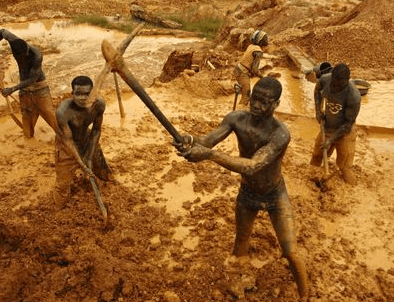Ghana government to spend $100m on land reclamation – Dr. Karikari
 Government is poised to spend 100 million dollars to reclaim lands destroyed by activities of illegal miners in the country through the Multi-sectorial Mining Integrated Project (MMIP).
Government is poised to spend 100 million dollars to reclaim lands destroyed by activities of illegal miners in the country through the Multi-sectorial Mining Integrated Project (MMIP).
The five-year project is an initiative of the Ministry of Lands and Natural Resources (MLNR) aimed at combating ‘galamsey’ and also sanitizing the artisanal small scale miners in the country.
Dr. Isaac Karikari, the Project Lead made this known during the Media Coalition Against Galamsey (MCAG)/National Commission for Civic Education (NCCE) 6th Town Hall Meeting in Bole in the Northern Region.
Components of MMIP included; the reclamation and dredging of affected rivers, a review of legal framework with regards to the issuing of license and provision of alternative livelihoods for people engaged in ‘galamsey’ among others, he said.
The MMIP Lead hinted that government had started signing Memorandum of Understandings (MOUs) with collaborators and also entering into Public Private Partnership (PPP) agreements through which the project would be funded.
He explained that the collaborators were companies who had their own money and were doing something similar to what the Ministry was doing while the PPP were organisations with their own funding but wanted government to meet them half way by allowing them to mine and use the money to reclaim the land.
Dr. Karikari said doing reclamation was expensive but assured that the amount would be raised from the gold that would be gotten during the processes leading to the reclamation of the lands.
Dr Anthony A. Duah, Hydrologist and a Representative of the Centre for Scientific and Industrial Research of the Water Research Institute in a presentation titled “Effects of Galamsey on the Environment” noted that Ghana’s available water resources were enough compared to its current population.
He said the country’s water resources were however threatened by activities of illegal miners, improper solid and liquid waste disposal, poor land use practices, and sand winning as well as deforestation activities.
Dr Duah highlighted that generally, destruction of the environment caused by mining activities had reached alarming proportions and needed to be controlled to avoid the negative impact of inadequate water supply, poor water quality, loss of aquatic life and loss of recreation.
He said the moratorium placed on small scale mining by the government was good, saying since then turbidity levels of water bodies had been declining drastically, and urged all to come on board to help stop ‘galamsey’ in the country.
Madam Veronica Alele Heming, Bole District Chief Executive said ‘galamsey’ was a canker that successive governments tried to overcome without maximum success and commended the MCAG for stepping up the campaign by the government to end or minimise the practice.
“The effects of ‘galamsey’ are detrimental to our survival as a people. I am therefore appealing to those who genuinely wish to do small scale mining to seek for appropriate licenses so that their mining activities could be rightly monitored to avoid destruction of the environment and the water bodies”, the DCE urged.
Source: GNA
